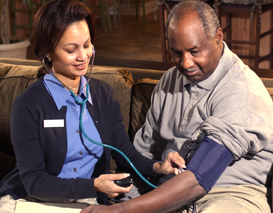Stroke: Resources and Support for Your Home Care
When you go home from the hospital or rehab, you or your loved one may still need support. A social worker, case manager, nurse, or therapist can help plan your care and find support where you live.
The Kentucky Neurosciences Institute Clinic can help. This is where the doctor that cared for you in the hospital does office visits. Call 859-323-5661 for appointment information. The clinic also offers neuropsychology services. This service studies how brain injuries may affect your life. Your doctor can tell you more about this.
Planning your home care
Depending on your need, your insurance may cover these services. Health care providers may meet in the clinic or make home visits.
-
A nurse may check the patient’s blood pressure.
-
A physical therapist may help with exercises.
-
An occupational therapist may help a patient handle daily tasks.
-
A speech therapist may show the whole family how to communicate.
Some stroke survivors need special equipment at home. They help patients be more independent. Your therapists will work with you if you need any of these items.
|

|
Your Area Agency on Aging may provide other types of care and support
-
Respite care provides a person to watch the patient at home for a short time. It gives relief to people who care for a sick loved one. The National Family Caregiver Support Program may help pay for respite care.
-
Adult daycare is for people who need help during the whole day. It lets family caregivers work and do other activities.
-
Stroke support groups give stroke survivors and caregivers the chance to meet and help each other. There are also online stroke support groups.
-
UK HealthCare’s Kentucky Neuroscience Institute offers Brain Matters, a support group providing a safe space of sharing and healing for those who have experienced neurological disease or injury, as well as families and caregivers. It meets the first Tuesday of each month from 6 p.m. to 7 p.m. on Zoom. To register for the support group, scan the QR code. For more information, please email [email protected].

-
Meals on Wheels delivers meals to the homes of people in need. You can call your local Senior Center.
-
Senior Centers are in every county. A center can help set up Meals on Wheels. It may also offer adult day care and other services.
-
Local Area on Aging promotes the well-being of older Americans. It provides services and programs to help them live independently in their homes and communities.
Other resources
You can find resources near you. Some examples are churches and synagogues, recreation centers, adult daycare, social services, and support groups.
These organizations can help you find local resources:
American Stroke Association:
Family Caregiver Alliance: Call 1-800-445-8106 or visit www.caregiver.org.
Meals on Wheels Association of America: Call 1-888-998-6325 or visit www.mowaa.org. You can also call your local Senior Center.
National Stroke Association:
Kentucky Cabinet for Health and Family Services: Visit chfs.ky.gov.
Online resources
-
MedlinePlus: Visit medlineplus.gov.
-
National Institute of Neurological Disorders and Stroke: Visit ninds.nih.gov.
-
The Internet Stroke Center: Visit www.strokecenter.org.
-
The Stroke Network: Visit www.strokenetwork.org.
-
US Centers for Disease Control and Prevention: Visit www.cdc.gov/stroke.